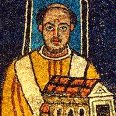by St. Theodoret of Cyrus
 Our father among the saints, Theodoret of Cyrus, Cyrrhus, (c. 393 – c. 457) was an influential author, theologian, and Christian bishop of Cyrrhus, Syria (423-457). He played a pivotal role in many early Byzantine church controversies that led to various ecumenical acts and schisms.
Our father among the saints, Theodoret of Cyrus, Cyrrhus, (c. 393 – c. 457) was an influential author, theologian, and Christian bishop of Cyrrhus, Syria (423-457). He played a pivotal role in many early Byzantine church controversies that led to various ecumenical acts and schisms.
This little gem comes to us from my friend Fr. Ted Bobosh at St. Paul the Apostle Church in Dayton, OH.
Theodoret like many of the Patristic writers in the Antiochian biblical commentary tradition does not hold to the tenets of what is commonly called “original sin” as translator Robert Hill noted in his comments.
“Theodoret never speaks of original sin or the transmission to posterity of the guilt for Adam’s sin…” (translator’s note p 81).
Theodoret writes,
“Thus the punishment is not the result of anger, but part of a divine plan of the greatest wisdom…. So that the human race would hate sin as the cause of death, after the transgression of the commandment, God, in his great wisdom, passed the sentence of death and in this way both ensured their hatred of sin and provided the race with the remedy of salvation, which, through the Incarnation of the Only-begotten, achieves the resurrection of the dead and immortality.” (p xlix)
“Indeed, death is healing, not punishment, for it checks the onset of sin: ‘He who has died has been acquitted of sin.’ (Rom 6:7) He ordered him to live directly opposite the garden so that he would remember his trouble-free existence and hate sin for causing his life of hardship.”(p 91)
Theodoret sees mortality not a punishment for human sin but rather part of God’s own merciful plan. By making death the result of sin, Theodoret sees humans hating sin and regretting their sin. Additionally by making death the consequence of sin, God was providing the way for salvation through the death of His Son and His resurrection.
“We learn from all these passages (i.e., from Ps 51:5; Gn 8:21; Rm 5:12), not that the power of sin is built into human nature—for if that were the case, we would not be liable to punishment—but that our nature is inclined to slip and fall, as it is undermined by the passions. Nonetheless, rationality prevails when supported by our efforts ….”
(Compare this with Augustine’s remark… on the same verse:
“No one is born without trailing along with him the punishment [i.e., for Adam’s sin] and the guilt that merits that punishment.” (translator’s note, p 95))
Augustine has humans inheriting the guilt of original sin as well as the punishment for this sin. Theodoret does not believe humans have inherited a depraved human nature – otherwise each human would not be responsible for his own sin. Theodoret recognizes that humans are each subject to passions which lead us to sin, but he believes optimistically that the rational part of human can overcome the passions.
To those Patristic writers who suggested that Adam and Eve were originally pure spiritual beings who received bodies and flesh only when God clothed them with skins after the Fall, Theodoret writes:
“Since holy Scripture says that the body was formed even before the soul, how can this claim that the man and woman took mortal flesh only after the transgression of the commandment amount to anything but a fable?” (p 89)
Theodoret believes bodily existence is part of human nature from the beginning, not something which became part of humanity after humans sin.
Why was it that, though Adam sinned, the righteous Abel was the first to die?
“God wanted Death’s foundation to be unsound. If Adam had been the first to die, Death would have established a strong base by taking the sinner as his first victim. But since he first took the man unjustly slain, his foundation is insecure.” (p 97)
Theodoret offers a rational idea about why Adam does not immediately die after eating the forbidden fruit as God had threatened him. If death had claimed Adam first, death would be just for humans. But since death wrongfully took the life of the innocent Abel, as death will later unjustly claim the innocent Christ, so death proves itself not part of justice and righteousness but part of evil which God rightly destroys.
